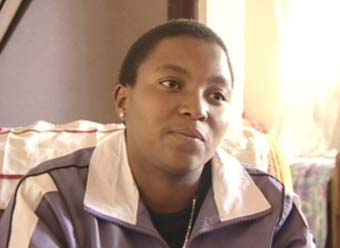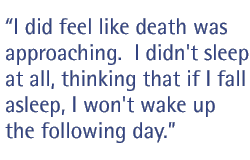
Gang-raped by four men on a train, Dorothy Maksalatiba didn't think to be tested for HIV; she didn't believe the virus existed. Finally, when her newborn son kept coming down with mysterious illnesses, they were both tested, and the results came back positive. Today, Maksalatiba -- who at one point was so sick she checked into a hospice to die -- and her son are healthy and receiving free antiretrovirals; a second son is HIV-free because medicine prevented mother-to-child transmission. Like so many other South Africans, Maksalatiba is receiving the drugs thanks to international assistance, in her case from President Bush's Emergency Plan for AIDS Relief (PEPFAR). But the $15 billion program is only funded for five years; "I'm just praying that [the drugs] can be available for the rest of my life," she says, "because if I don't believe that, my health is going to go down again." This is an edited transcript of Maksalatiba's interview with FRONTLINE on June 22, 2005.
Do you remember when you first heard about HIV/AIDS?
I used to hear about it from the TV and the newspapers, but then I wasn't interested in it because I didn't believe that it existed.
Why not?
At first I was ignorant.
And how did you find out that it did exist?
I went to the clinic one day in Pretoria, and I saw some people. They said, "This person is HIV positive and now he's developed AIDS, and that's why he's sick." The reason I went to the clinic that day was because my grandmother was very sick. [But] the nurses were saying, "If you don't take care of yourself, this is what's going to happen to you."
What kind of impact did that have on you?

It shocked me that I was so ignorant that people out there are dying. Then I realized that I'd been a fool, not realizing that this thing really exists.
And then how did it begin to affect you personally?
It affected me personally in 2001, after I delivered my son. When he was about 11 months old, he was sick all the time, always going to the hospital. The doctors were trying this and that, but nothing ever worked. So the doctor one day, when I went back to the hospital in Pretoria, told me: "Why don't we just try and test him for HIV and AIDS? Maybe he might have [it]; maybe he might not have [it]. Let's take a chance with that so that if he is HIV positive, then we'll know what there is to work on." I agreed that he be tested for HIV, and I was also tested. After two weeks the results came back positive, both for me and him.
And what kind of impact did that have on you?
I was shocked, and I was a little bit in denial. I didn't know what to do. I kept everything to myself. I didn't tell anyone, not even my mother. It was just the doctors and the nurses at the hospital. I kept it secret for about six months. It was eating me inside. I was always worried; I was stressed all the time; I couldn't eat properly, and I lost a lot of weight.
And then what happened?
Then I became pregnant with my second boy. Then after that, I said, "If my firstborn tested positive, what's going to happen to [my second child]?" Then they gave me the nevirapine; I was about 26 weeks' pregnant. I took the nevirapine before going to the hospital, and when I got to the hospital, I told them, "Listen, I'm HIV positive, and I'm under this program of taking the nevirapine." After I delivered my second born, they gave the nevirapine, but in syrup. After six weeks I went back to the hospital again for him to get tested, and the test came back negative. ...
Do you know how you got HIV?
Yes. I was gang-raped by four men. I was living in Pretoria with my mum. It was at December time -- after school, you go to the shops looking for a job, and you always travel by train. Then, unfortunately, I fell asleep in the train, and I got gang-raped by those guys. They had hats on their faces, so I couldn't identify them. Then after that I just passed out. ... There was blood all over me, and I didn't know what happened to me. But I stood up; I said: "Dorothy, you've been raped. Go straight to the police station." I went there to the police station, and unfortunately the police were very rude toward me. They said, "You don't look like somebody who's been raped," and then they just ignored me.
Then I went home and took a cold bath, thinking that everything would just go away, but it didn't. It didn't come to my mind that I had to go to the clinic to be tested or anything. I didn't think of that. The only thing that was in my mind was I have to get myself clean; I have to wash myself, and then everything will just go away.
Then I just took everything and put it at the back of my mind, and I didn't tell anyone because I was too ashamed. I told myself I caused this to happen to me because I fell asleep, so it was my fault. I wasn't supposed to fall asleep in the train. I blamed myself for it.
You seem very comfortable talking about it now. You don't blame yourself anymore?
No, I don't blame myself anymore. I know it wasn't my fault. It wasn't my fault at all. ...
And then you started working at the hospice. How did that come about?
When I was still pregnant with my second born, the home-based care person was just doing door-to-door visits. ... She found me in here, and I was stressed and pregnant. I just said: "Why don't I tell her? Maybe she can help me; I don't know."
People here, they knew [the name of the hospice], and they always say if you are a patient, it means you've got AIDS, and then you are dying. You are still a taboo here. But I talked to her. Her name was Esther, and I told her: "I'm HIV positive, and my son's HIV positive, and now I'm pregnant, so I don't know what to do. I'm stressed, and I don't have anything to eat." I wasn't working or anything. And then she told me: "Listen, there is a place called Sizanani [Village, an NGO near Pretoria which operates St. Joseph's Care Centre, a hospice for people with HIV/AIDS]. They will help you." She went back to her superiors, and then she came in and said: "Listen, they are prepared to help you with food and everything. If you need some help, they will help you."
I started receiving food parcels every month. It continued and continued, and I went to see the place, because I didn't know what kind of place it was. They just welcomed me with warm arms, and then I felt at home.
When you began working at the hospice and you saw some of the people with advanced AIDS, what was that like?
When I started working there, it was very hard. I was always crying because of seeing people dying, because families are bringing the patients very terminally [ill], and there's nothing they can do for them. The ARVs [antiretrovirals] don't work for them anymore. It was very depressing for me, but I was always with the social worker. She was always counseling me: "Listen, Dorothy, ... I know it's stressing, but you have to be strong." And then I said, "I'll try," but it's very hard, because seeing people dying of HIV/AIDS and knowing that I'm HIV positive is very hard. ...
And you've been able to get on ARVs, and your son? How did that happen?
They told us that there are some donors who are going to donate to us, and then we're going to get the ARVs. Then they said anyone who is ready and who feels strong enough and who will go by the rules of ARVs can come and get them. I said, "Listen, I'm much more ready than anybody else, because of my son getting sick all the time." It was just really killing me inside. So I applied for the ARVs.
After two weeks, the ARVs were being rolled out to the patients. The side effects were not that bad, really. With my son, he only got a rash in the face and a little bit of diarrhea and a little bit of fever. Then after two weeks, the rash just went away, and then he was fine.
And how about for you? What was your CD4 count when you began them?
When I began taking the ARVs, my CD4 count was 135, so it was below 200. I was very skinny. I was coughing all the time. People were saying that maybe I've got TB or something, but it wasn't TB. ... I was getting weaker by the day. ... I was very thin. I used to weigh 35 kilograms [about 70 pounds], so I was very thin, and I wasn't good at all. My feet were swollen. I had sores under my feet; I had sores on my face. And I'd got thrush in my mouth.
Were you worried?
Yeah, I was worried that if I die now, what's going to happen to my two sons? Who's going to take care of them? ...
Did you feel like death was approaching?
Yes, I did feel like death was approaching. I didn't sleep at all, thinking that if I fall asleep, I won't wake up the following day, so I'll just sit here in the house and worry and worry more.
And you began taking the drugs.
Then I began taking the drugs, and then I saw some improvement on my face, on my feet. I was gaining weight, because from 35 kilograms, I now weigh 78 [about 160 pounds]. So I've gained a lot of weight.
And how are you feeling?
The ARVs are doing a great job. I feel good about myself; I can plan my future ahead. I can say, "In 10 years time I want this, I want that," because I know the ARVs will work for me. ...
Are you confident in your own mind that the drugs that you're getting now, the ARVs, are going to be available for you in five or 10 years time?
Yes, yes.
Have they made that promise to you?
No, they haven't made that promise to me, but I'm just praying that they can be available for the rest of my life.
And you believe they will be.
Yeah, I have to believe that, because if I don't believe that, my health is going to go [back down] again. I have to be positive in everything that I do.
What's your attitude now?
It has improved a lot, really. And I don't mind talking about the HIV. I even talk to the prisoners in jail, because I feel like I have to help someone because I've been helped. If I give just a little bit of help, a little bit of hope or help, I feel good about myself.
